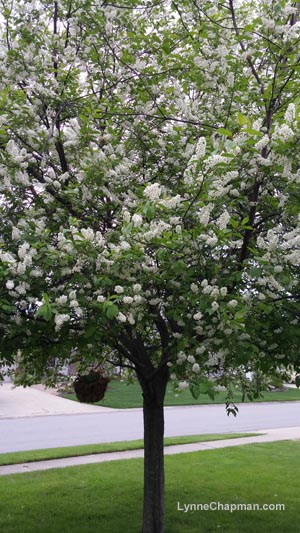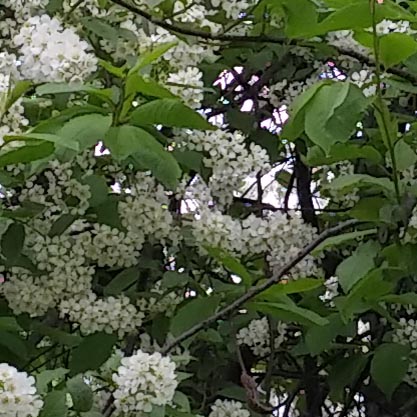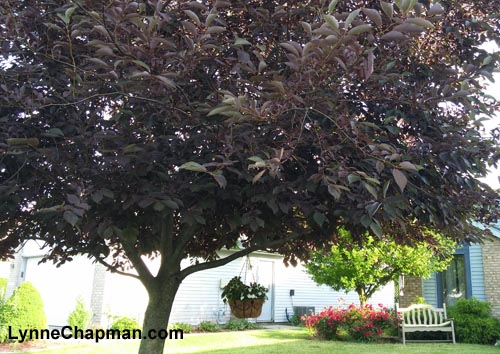 I felt God’s blessing when I found this house. More than the interior, I’m first attracted to landscaping. This beautiful tree, in my front yard, attracts a lot of attention every April and May. It reigns over the yard, without concealing the house or other plantings. The year I moved into my new home, I was taken with the beauty of its blooms. Just as the bright green leaves began emerging in the spring, cone shaped clusters of white flowers appeared. As you see in the photograph, this tree is a beautiful showpiece. Later, in that first year, I was concerned to see the green leaves turn bright reddish purple in the summer. However, with some investigation, I discovered the identity of the tree and learned that this is normal, and part of its attraction. My tree is a Canada Red Chokecherry. The tree also produces small dark purple fruit. It is loved by the birds and said to be useful in making jams and jelly, although I haven’t tried eating them. I was glad to read my Canada Red is hardy, good in zones 2 to 6. I’m in zone 5. And it is mature, at about twenty to thirty feet. Enjoy the spring photos of this gorgeous tree. I'll post another photo when it changes color this summer.
2 Comments
There are some days - many days - when I need a positive thought to lift my spirit. Listen to these positive thoughts. The best thing about them is they are true! In heaven everything will be pure and unadulterated. All of our thoughts will be holy. In heaven we won't say, "I wish, ..." because every longing we've ever had will be satisfied. We'll be totally content. I heaven we won't spoil things like we did on earth. The air will stay fresh and clean. Rivers will sparkle. No garbage will mar the beauty of the landscape. These lovely thoughts are a few snippets from the book "Snapshots of Heaven" by Joyce Vollmer Brown. If you're like me, you'll want to read it over and over. Sometimes I flip it open and read just a page or two. They are all beautiful insights into heaven, you may not have considered before, and each one is true. They are all based on Scripture. Read my full review on Christian Living @ BellaOnline.com. Find this book on Amazon.com . (I purchased it myself and was not asked or paid for a review.) You've heard the "You might be a Hoosier" jokes before. Here are a few more you may only understand if you are from a small Indiana town.
You’re from a small Indiana town if: Your idea of a traffic jam is ten cars waiting to pass a tractor on the highway. You drive out of your way to avoid a traffic light. You grew up knowing what "knee high by the fourth of July" meant. You vacation on a Florida gulf beach and see five people from your home town. You don’t drink soda, you drink pop. It has been sixty degrees at Christmas and snowed during Spring break. You come to a stop before turning off the highway into a parking lot. You have eaten turtle. (I swear, this is not a joke. It tastes like chicken.)
My husband Jim, battled emphysema and a bone marrow disorder for many years. When he didn’t have the strength or the breath to walk, I pushed him in a wheelchair to doctor appointments and blood transfusions. We knew one or the other illness would take his life. We knew he wouldn’t get better, only progressively worse. But we had faith. We believed in God’s promise of Heaven. Our faith and our love for each other grew stronger throughout set-backs and treatments. One weekend I called the EMS to take Jim to the hospital, as I’d done on several other occasions. We expected he would receive treatment and I’d bring him home. But this time the doctor informed us the bone marrow disorder had become acute leukemia. There was nothing he could do. My husband might live long enough to go home with hospice care. But that wasn’t to be. I sat beside him in his hospital room and held his hand. In the middle of the night, the love of my life took his final labored breath. I sat with him, feeling the lingering warmth leave his body, called relatives and forced myself to leave him. While I drove the lonely streets in the dark, reality hit. I shouted, “What will I do without you?” I pounded the wheel and reduced speed, as street lights blurred through the tears filling my eyes. A dark, empty house greeted me and I prepared for bed. In the silence, I knew I would never again hear the sounds of Jim coming home or feel his weight on the other side of the bed. Never another kiss goodnight. The loneliness of a first night as a widow was something I couldn’t have anticipated. I had faith. I knew in my mind, Jim was with Jesus. But mental knowledge didn’t seem to be strong enough for that black night. After caring for him for so long, preparing medication, massaging his aching muscles—my hands were empty. There was nothing I could do for him now, and my faith faltered. Was Heaven real or a story in a book? Was Jim with Jesus or in the morgue at the hospital? Was he happy? Those questions threatened to suffocate me. There was nothing I could do but go to bed and wait for morning, when family would arrive. I laid my head on the pillow. Then, the instant I closed my eyes, I saw them—a group of men sitting around a campfire, in my backyard. They were big men and wore white. The fire glowed from the center of the circle. In fact, they all glowed white. I didn’t have time to think about who or what they were. God’s perfect peace filled my being. On the most horrible day of my life, I was filled with intense peace, deeper than I’d ever thought possible. I slept soundly that night. Every night for at least two weeks, I experienced the same vision—angels standing guard, keeping me company. Just like Elisha’s servant, in 2 Kings of the Bible, God opened my eyes to the truth. My beloved husband had simply stepped through the curtain into a world more real and glorious than the world here. He was healthy and strong and happy. I still struggle at navigating life as a widow. But when things get tough, I look into the yard where angels sat at a campfire that night, and I think perhaps they’re still there. "The angel of the Lord encamps around those who fear him, and delivers them." Psalm 34:7 ESV  Believers are experiencing growing resistance to their Christian belief. How is the Christian expected to give a defense of their hope-as we're told to in the Bible- without entering a heated exchange? Gentleness, goodness, joy, kindness, love, patience, self-control. These are attributes of the Fruit of the Spirit. They are ours when we put our trust in Jesus. It may be a surprise that they are already ours. They came when the Spirit took up residence. Many of us forget to put this gift into use. Read about arguments, using the Fruit of the Spirit and how conflict is good for us in this week's article: Argue With Patience and Humility Read more about the Fruit of the Spirit. Madam C. J. Walker, was a pioneer of the black hair care industry. Born into poverty, she was orphaned at age seven, married at fourteen and widowed by the age of twenty. For most of the next twenty years, she worked as a washerwoman. Madam Walker went on to become the first black woman millionaire and before women had won the right to vote. Born Sarah Breedlove in 1867, Madam Walker grew up in a time when it was difficult for black women to care for their appearance. Most had no running water and no beauty supplies suitable for their hair care needs. In a culture where the model for beauty was dictated by the Caucasian standard, any beauty supplies available were inappropriate for the hair of black women. The processes used to straighten hair were so damaging that they were painful and caused hair loss. Having experienced hair loss herself, Madam Walker began experimenting with preparations to nurture hair. She had an ideal of encouraging black women to take greater pride in their appearance and start giving their hair proper care. Madam Walker continued working as a laundress two days a week to pay for her infant business. She mixed her preparations in laundry tubs and sold them door-to-door. As she developed her business, she began training agents to sell for her for a commission and a share of the profits. In 1917, an average black woman made about $1.00 a day. By 1919, some of the 25,000 women who were Madam Walker’s agents earned as much as $1000.00 a day, seven days a week. She developed beauty colleges and beauty parlors throughout the United States, South America and the West Indies, where black women could go to be cared for and to feel beautiful. Madam C. J. Walker’s empire grew to include door-to-door, mail order, and drug store sales, beauty salons and colleges, and manufacturing facilities. Her first products were: · Wonderful Hair Grower, which restored hair loss due to malnutrition and poor care, · Glossine, a hair oil that would keep the hair manageable, · Vegetable Shampoo, · Temple Grower and Tetter Salve, designed to cure psoriasis. · A Steel Comb with the teeth properly spaced to allow black women to straighten their hair. The comb was heated and with a special ointment was applied to it that made the hair easier to manipulate. Madam Walker had hoped, that by improving their appearance, black women would gain a sense of dignity and self-esteem and therefore be able to find better employment. Madam Walker helped thousands of women build a better life and is a role model to all women. There is much more to Madam C. J. Walker’s life than I have had time to tell you about. If you are interested in learning more, read On Her Own Ground: The Life and Times of Madam C. J. Walker or Madam C. J. Walker (Black Americans Of Achievement). As long as I can remember, I knew the term Hoosier referred to a resident of Indiana. In grade school I was given one of the following reasons for the nick-name.
1. Coming from the word Hoosa, meaning American Indian maize or corn. 2. Indiana employees of a canal contractor named Hoosier, were called Hoosier’s Men 3. James Whitcomb Riley joked that it came from early Indian settlers following tavern fights, wondering “Who’s ear” had been cut off and left on the floor. 4. Early Indian settlers were said to answer a knock on the door with “Who’s here?” 5. Another legend says that the nick-name is a shortened form of “Who’s your (relative)?” If you have been referred to as a Hoosier, what explanation were you given? |
The mundane becomes inspiration.Categories
All
|



 RSS Feed
RSS Feed

